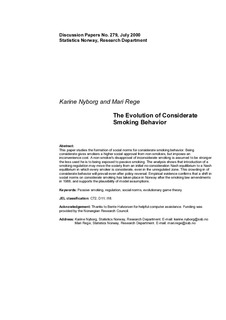| dc.contributor.author | Nyborg, Karine | |
| dc.contributor.author | Rege, Mari | |
| dc.date.accessioned | 2011-12-13T12:01:27Z | |
| dc.date.available | 2011-12-13T12:01:27Z | |
| dc.date.issued | 2000 | |
| dc.identifier.issn | 1892-753x | |
| dc.identifier.uri | http://hdl.handle.net/11250/180105 | |
| dc.description.abstract | This paper studies the formation of social norms for considerate smoking behavior. Being considerate gives smokers a higher social approval from non-smokers, but imposes an inconvenience cost. A non-smoker's disapproval of inconsiderate smoking is assumed to be stronger the less used he is to being exposed to passive smoking. The analysis shows that introduction of a smoking regulation may move the society from an initial no-consideration Nash equilibrium to a Nash equilibrium in which every smoker is considerate, even in the unregulated zone. This crowding in of considerate behavior will prevail even after policy reversal. Empirical evidence confirms that a shift in social norms on considerate smoking has taken place in Norway after the smoking law amendments in 1988, and supports the plausibility of model assumptions. | no_NO |
| dc.language.iso | eng | no_NO |
| dc.publisher | Statistics Norway, Research Department | no_NO |
| dc.relation.ispartofseries | Discussion Papers;No. 279 | |
| dc.subject | Passive smoking | no_NO |
| dc.subject | Smoking | no_NO |
| dc.subject | Social norms | no_NO |
| dc.subject | Norms | no_NO |
| dc.subject | Evolutionary game theory | no_NO |
| dc.subject | JEL classification: C72 | no_NO |
| dc.subject | JEL classification: D11 | no_NO |
| dc.subject | JEL classification: I18 | no_NO |
| dc.subject | Røyking | |
| dc.subject | Røykevaner | |
| dc.title | The Evolution of considerate smoking behavior | no_NO |
| dc.type | Working paper | no_NO |
| dc.subject.nsi | VDP::Social science: 200::Sociology: 220 | no_NO |
| dc.source.pagenumber | 22 s. | no_NO |
